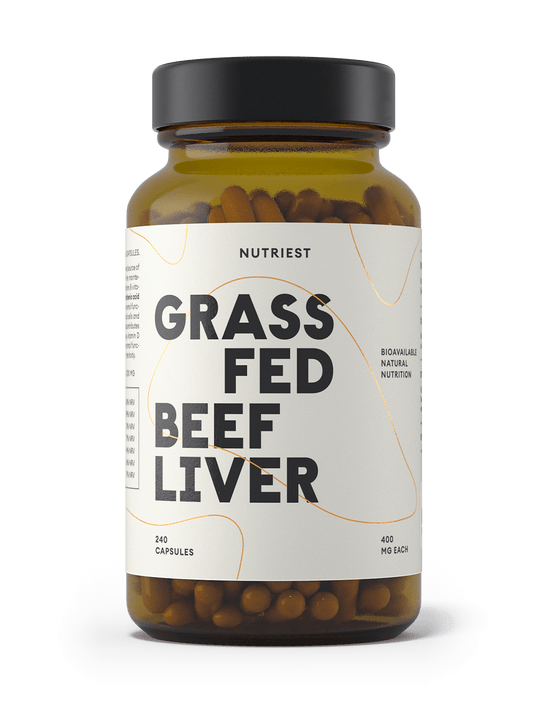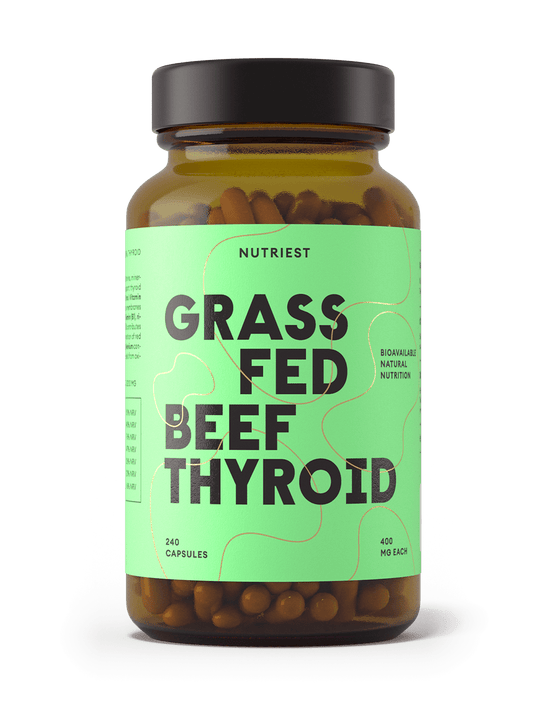Introduction
Do you often feel tired, stressed, and lacking energy – even though you get enough sleep and strive to live a healthy lifestyle? The cause may lie deeper, more specifically in your thyroid. Anyone who wants to improve their thyroid function should understand how closely it is linked to stress and energy production in the body.
The US physiologist Ray Peat has repeatedly emphasized in his work that chronic stress and a weakened thyroid trigger a vicious cycle of exhaustion, helplessness and hormonal imbalance.
The thesis of this article: If you learn to specifically support your thyroid, you can not only reduce stress but also noticeably increase your mental and physical energy.
Inspired by: https://raypeat.com/articles/articles/dark-side-of-stress-learned-helplessness.shtml
Why a healthy thyroid is the key to less stress
Your thyroid is much more than a small organ in your neck—it's the control center of your energy balance. A well-functioning thyroid ensures that every cell in your body has sufficient energy. If this system becomes unbalanced, you'll quickly feel the consequences: lack of motivation, mood swings, weight gain, and increased susceptibility to stress. That's why it's so important to improve thyroid function if you want to remain productive and balanced in the long term.
Ray Peat describes the thyroid as a central organ for stress regulation. If thyroid hormone levels are too low, your metabolism slows down – and your body goes into emergency mode. In this state, the risk of chronic stress increases significantly, as important stress hormones like cortisol remain in the bloodstream longer, reducing your ability to recover.
Typical signs of thyroid dysfunction that are often overlooked include cold hands and feet, difficulty concentrating, and emotional instability. Many people live with these symptoms for years without knowing that their thyroid plays a role.
If you want to improve your thyroid function , in addition to diet, light, exercise, and sleep also play a crucial role. Peat particularly emphasizes the importance of easily digestible carbohydrates, sufficient animal fats, and avoiding inflammatory foods. All of this helps your body get back into what's known as "energy-producing mode"—which, in turn, strengthens your resistance to stress.
The conclusion of this section: A healthy thyroid not only means more energy, but also a more natural way of dealing with stress. You can actively influence it – and the first step begins with knowledge and attention to your body.
Learned helplessness – When stress paralyzes you
Maybe you know the feeling: You're constantly under pressure, trying to do everything right – and yet nothing seems to change. At some point, you give up inside. This psychological pattern is called learned helplessness – a state in which you lose the feeling of having control over your life. Ray Peat describes this very process as one of the most dangerous consequences of chronic stress because it deeply affects your metabolism and nervous system.
According to a study by the Max Planck Institute of Psychiatry (2018), chronic stress can trigger excessive activity of the hypothalamic-pituitary-adrenal (HPA) axis—the body's central stress axis. This leads to elevated cortisol levels, which, in the long term, suppress thyroid hormone production. The result: You feel weak, discouraged, and "burned out."
A long-term WHO study shows that over 300 million people worldwide suffer from depression – many of which are triggered or exacerbated by persistent stress and feelings of helplessness. In Germany, according to a survey conducted by Techniker Krankenkasse, over 26% of respondents report regularly feeling "at the mercy of others" – a classic symptom of learned helplessness.
Ray Peat argues that this condition is not only psychological, but also biochemical: Chronic stress causes increased levels of acetylcholine, which, in excessive concentrations, can lead to a kind of mental paralysis. In addition, the mitochondria—the "powerhouses" of your cells—function less efficiently under chronic stress, leading to a lack of energy in the brain.
The good news: Learned helplessness is reversible. Studies show that targeted lifestyle changes—such as regular exercise, sunlight, social connections, and a nutrient-rich diet—can help break this state. The thyroid plays a key role here, too: By improving your thyroid function , you support the hormonal and energetic foundation needed to move from paralysis to empowerment.
In short: Learned helplessness isn't a personal failure, but a biological reaction to chronic stress. But with the right understanding, you can take targeted countermeasures—and regain control over your life.
Acetylcholine and Depression – The Forgotten Messenger Substance
When it comes to depression, many people first think of serotonin or dopamine. But another, often overlooked neurotransmitter plays a central role: acetylcholine . Ray Peat emphasizes in several of his articles that an acetylcholine deficiency can not only exacerbate depression but also contribute to its development—especially in combination with chronic stress and weakened thyroid function.
What is acetylcholine – and why is it important?
Acetylcholine is a neurotransmitter responsible for, among other things, attention, memory, muscle control, and emotional stability. Too much can lead to irritability, anxiety, or insomnia; too little, however, can lead to listlessness, memory loss, and depression. This is precisely where the problem begins for many people: Under stress, their equilibrium is thrown off.
Frequently asked questions and concerns
“How do I know if I have an acetylcholine deficiency?”
Typical symptoms include mental exhaustion, difficulty concentrating, lack of motivation, and emotional emptiness. Many sufferers describe the feeling of "not being able to fully wake up" – even after sufficient sleep.
“Can I supplement acetylcholine directly?”
Not directly—but you can specifically consume precursors like choline through your diet (e.g., in eggs, liver, shrimp). However, Ray Peat warns against consuming choline in isolation, as excess can also have negative effects, especially if your thyroid is sluggish.
“What does my thyroid have to do with this?”
The thyroid influences your entire metabolism—including neurotransmitter production. When your thyroid function improves , your nervous system can function more efficiently and restore the balance between acetylcholine and other neurotransmitters like dopamine or serotonin.
What you can do
-
Make sure you eat a balanced, nutrient-dense diet with high-quality animal fats and proteins.
-
Avoid cholinergic overstimulation from supplements that promise “memory boosters.”
-
Support your thyroid with light (especially in the morning), good sleep, and foods like root vegetables, dairy products, and fructose—all of which, according to Ray Peat, are helpful for energy metabolism.
Nitric oxide – the silent energy thief in the brain
Nitric oxide (NO) is often celebrated in conventional medicine as a "miracle molecule": It dilates blood vessels, lowers blood pressure, and supports the immune response. But Ray Peat warns urgently about the dark side of this molecule—especially in connection with chronic stress and neurological diseases. In his work, he describes how excessive nitric oxide in the brain blocks energy production and contributes to exhaustion.
What exactly is the problem?
NO has been shown to inhibit mitochondrial respiration—the process by which your cells generate energy from food. This can lead to massive problems, especially in the brain, which relies on a constant supply of energy: difficulty concentrating, low moods, and chronic fatigue. Studies show that permanently elevated NO levels play a role in neurodegenerative diseases such as Alzheimer's or Parkinson's.
What promotes too much NO in the body?
-
Chronic stress
-
Inflammatory processes
-
Excessive consumption of nitrites (e.g. from processed meat products)
-
Too little sunlight
What can you do?
-
Ensure regular sun exposure, especially in the morning.
-
Reduce inflammatory foods and replace them with easily digestible, nutrient-rich foods (e.g., fructose, saturated fats).
-
Support your thyroid – because when your energy production is running at full speed, NO is better regulated.
Mitochondrial Energy – How to Regain Your Strength
Mitochondria are considered the "powerhouses of the cells" – and they play a central role in your physical and mental energy. Especially in the brain, stable mitochondrial energy production is crucial for your ability to concentrate, emotional stability, and overall quality of life.
Ray Peat repeatedly focuses on mitochondrial health in his articles because it is inextricably linked to thyroid function. When you improve your thyroid function , you also activate your mitochondria—and vice versa.
What weakens the mitochondria?
-
Chronic stress
-
lack of sleep
-
Undersupply of thyroid hormones
-
Excess of unsaturated fatty acids (PUFAs)
-
An excess of nitric oxide
What strengthens them?
-
Sufficient T3 (the active thyroid hormone)
-
Easily digestible carbohydrates (fruit juices, honey)
-
Sufficient animal fats (butter, milk)
-
Avoiding vegetable oils and excessive fasting
-
Regular sleep and light supply
Why is this so important for your brain?
A lack of energy in the brain manifests itself not only as fatigue, but also as listlessness, irritability, or depression. So, if you specifically strengthen your mitochondrial energy in the brain , you're doing far more than "just" combating fatigue—you're supporting your overall mental health.
The conclusion of this section: Energy is not an accident—it is the result of biochemical processes that you can actively influence. With a thyroid-friendly diet, sufficient light, and targeted stress reduction, you can strengthen your mitochondrial health—and thus sustainably improve your quality of life.
Conclusion: Your path to more energy and inner strength
Chronic stress, exhaustion, and depressive moods are not inevitable—they are often the result of an overburdened body and an imbalanced energy system. As you learned in this article, the thyroid plays a central role in this. By improving your thyroid function , you not only support your metabolism, but also your nervous system, your mood, and your resistance to stress.
Here are the most important points at a glance:
✅ A healthy thyroid helps you break down stress hormones faster and keep your body in “energy mode”.
✅ Learned helplessness is not a character weakness, but a biological reaction to chronic stress – and it is reversible.
✅ Acetylcholine and nitric oxide influence your mental health more than many people think – and can be regulated through diet and lifestyle.
✅ Mitochondrial energy is the key to mental clarity, emotional stability and physical performance.
👉 If you want to optimize your energy levels and permanently reduce stress, start with your thyroid. Make sure you eat a nutrient-rich diet, get enough light, and get restful sleep—and avoid factors that promote inflammation.
Do you want to delve deeper or get practical tips for implementation?
Then subscribe to our newsletter and regularly receive in-depth knowledge about nutrition, hormones and energy – inspired by Ray Peat.
🔔 Subscribe now and bring your body back into balance!





